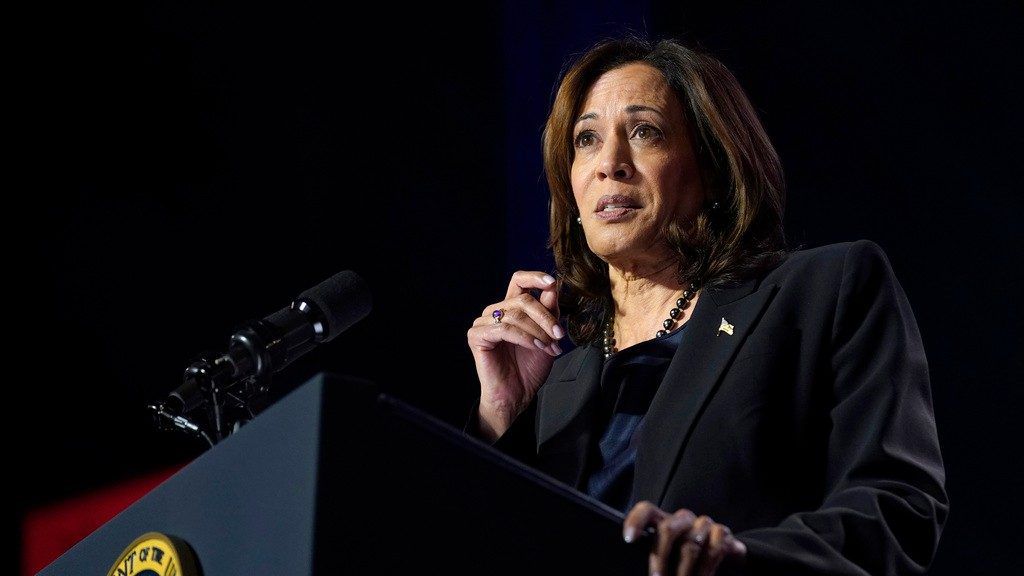Though Vice President Kamala Harris’s latest stop on her reproductive rights talking tour was interrupted multiple times on Monday, as protestors against the Israel-Hamas War shouted "cease-fire now!," Harris generally moved on through the afternoon’s program undaunted.
Her response evolved from understanding — "Let me say, in a real democracy, everyone has a right to have their voice heard," she said amid the first interruption — to pointed — "We have a lot of very important issues that we all must discuss, but the topic for this discussion is what we need to do to fight back against laws that are criminalizing health care providers and making women suffer in our country," she said during the second — to, eventually, just letting the crowd talk for her, sitting silently as protests were drowned out in chants of "four more years!"
Monday’s event took place at Mexican Heritage Plaza, in San Jose, Calif., a community center and school of arts and culture.
Her event — a moderated conversation with actor and activist Sophia Bush — was the latest stop on her "Fight for Reproductive Freedoms" tour, a series of events that serves as a rallying point for the Biden-Harris administration’s agenda in the run-up to the Nov. 2024 election. As such, during Monday’s talk with Bush, Harris condemned Republican leaders for their stances on civil and reproductive rights.
"We have, as a so-called developed nation, one of the highest rates of maternal mortality of any nation in the world. It’s a crying shame," Harris said. "The hypocrisy abounds — in the states with the the top ten worst numbers on maternal mortality, all have bans" on abortion, Harris said.
According to CDC data, maternal deaths increased in the U.S. from 2018 to 2021 — the most recent available data, and one year before the U.S. Supreme Court overturned Roe v. Wade and outlawing federal abortion protections. Out of the 37 states whose maternal mortality rates were calculated, states like Arkansas (43.5 deaths per 100,000 live births), Mississippi (43), Tennessee (41.7), Alabama (41.4) and Louisiana (39) — states that, since Roe was overturned, have enacted bans and strong restrictions on abortion — have the highest maternal death rates.
She credited California for, conversely, having the lowest rates of maternal death in the nation — 10.1 per 100,000 live births — and for codifying abortion rights into the state constitution.
But, she said, neighboring states don’t have those same protections. "And let’s not get too comfortable with that, because if these folks have their way — and they’ve already articulated it as part of their agenda — they’ll get a national ban," Harris said. "Let’s understand, none of us can afford to sit back and say 'thank God we’re in California.'"
Harris impressed the value of communication on the audience — urging them to speak with friends, family and strangers — and uplifting people who are suffering.
"The environment in which this issue exists is an environment that is heavily laden with judgement, suggesting to these women that they’ve done something wrong, something they should be embarrassed about," Harris said. "One of the things that can be most disempowering is when people feel they’re alon, when they feel they don’t have community, much less support. When they’re feel they’re being judged and outcast, as opposed to embraced."
Though, she suggested, the trend of attacking and beating down those who are suffering is not a bug so much as it is a feature for some conservative leaders — as with the attacks on LGBTQ+ rights, she said.
Only once, though, did she reference former President Donald Trump, the current frontrunner for the Republican presidential nomination, noting that he has said he’s "very proud" of his U.S. Supreme Court appointments.
"The overlap, then, between where we’re seeing attacks against voting rights, where we’re seeing attacks against LGBTQ, where we’re seeing the attacks against reproductive freedom, you would not be shocked to see the profound intersection between them," Harris said.
The day’s event was led off by a handful of dignitaries, including speeches from California’s Democratic U.S. Senators, Laphonza Butler and Alex Padilla; California State Assemblymember Buffy Wicks, who represents Oakland; Health and Human Services Secretary Xavier Becerra and Dr. Pratima Gupta, an OB-GYN at the University of California, San Diego, who shared the story of performing an abortion for a patient who traveled to California from a state with restrictive abortion laws.
"We should be proud of this in California, because this is how it should work everywhere," Gupta said. "Being unable to obtain an abortion has major effects on people's lives, their health and wellbeing. When access is restricted, she said, marginalized communities experience those effects most profoundly."



